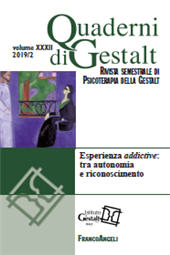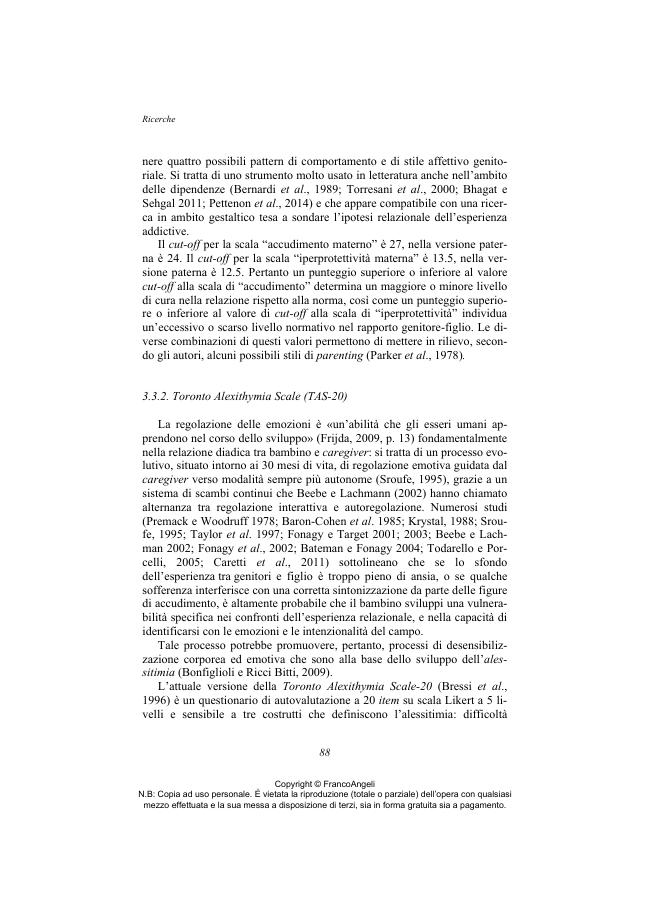Sintonizzazione genitoriale, riconoscimento degli stati affettivi e vulnerabilità alle addiction : alcuni dati di ricerca
79-97 p.
L'articolo propone un contributo di ricerca sul rapporto tra la sintonizzazione genitoriale, nei primi anni di vita, la co-regolazione affettiva e la vulnerabilità alle addiction. A partire da una lettura delle dipendenze patologiche come adattamento creativo in un campo relazionale contrassegnato da desintonizzazione relazionale primaria, e alla luce della prospettiva estetica di un disarmonico "sviluppo polifonico dei domini" (Spagnuolo Lobb, 2012; 2015), lo studio confronta due campioni di 26 soggetti ciascuno: un gruppo clinico di pazienti tossicodipendenti in trattamento e un gruppo di controllo.
Attraverso l'uso del Parental Bonding Instrument e del Toronto Alexithymia Scale, e grazie ad un'analisi descrittiva e correlazionale dei dati, viene messo in evidenza come la carenza di riconoscimento e di sintonizzazione nelle relazioni primarie costituiscano fattori di vulnerabilità allo sviluppo di alessitimia e all'adozione di un comportamento addicted. L'addiction si configura come un adattamento creativo in un campo relazionale insicuro, e il probabile esito disfunzionale di una relazione asimmetrica inadeguata. [Testo dell'editore].
The article proposes a research contribution on the relationship between parental attunement in the first 16 years of life, affective co-regulation and vulnerability to addictions. According to the Authors, addiction can be understood as a creative adaptation to a belonging intention never fully realized, the effort to overcome the relational void left by experiences of lack of attunement that have caused relational recognition to fail. If the background of the par-ent-child experience is too full of anxiety, or if some suffering interferes with proper attunement, the child is likely to develop a specific vulnerability that compromises good identification with the emotions and intention of the field. Thus, it is highly probable that, in front of excitements that are not supported and contained in the holding relationship, the child could implement processes of bodily and emotional desensitization, which is the precondition for the development of alexithymia: a creative adaptation to the perceived chaos.
The aim of this study is to evaluate the correlation between compelling experience and the quality of primary relationships and whether, and how, "traumatic" relational experiences work as a factor of vulnerability to the development of an addiction. Starting from a reading of pathological dependencies as a creative adaptation in a relational field marked by primary relational detuning, and in the light of the aesthetic perspective of a disharmonic "polyphonic domain development" (Spagnuolo Lobb, 2012; 2015), the study compares two samples of 26 subjects included: a clinical group of drug-dependent patients in treatment and a control group. All groups of subjects underwent the parental bonding tool (Parker et al., 1978) and the Toronto Alexithymia Scale (Bressi et al., 1996).
From the results, it emerges in the clinical group prevails a style of parenting called "control without affection", (low levels of caregiving and ligh levels of hyper-activity) both in the relationship with the mother and with the father; in the clinical group there are also significantly higher levels of alexithymia than in the control group. Thanks to the correlational analysis of the data, it is evident that the lack of good parent-child attunement in primary relationships is considered a factor of vulnerability to the development of alexithymia and can lead to a greater predisposition to engage in addictive behaviour.
The authors therefore believe that early relational failures in parental care can lead to an emotional-relational and neurobiological background positive to a specific vulnerability in regards to addictive experiences. In this sense, the addiction takes the form of a creative adaptation in an insecure relational field, as the outcome of an inadequate asymmetrical relationship, as well as a dramatic attempt to realize a unacknowledged and non supported intentional contact in the caregiving relation-ship, which is always an intentionality of belonging. The article was produced without any funding. [Publisher's text].
-
Articles from the same issue (available individually)
-
Information
ISSN: 2035-6994
DISCIPLINES
KEYWORDS
- Addiction, parenting, alessitimia, sintonizzazione relazionale, intenzionalità relazionale
- Addiction, parenting, alexithymia, relational tuning, relational intentionality



